Chesapeake Blue
In January of 2020, Cece and I spent a month visiting my grandparents in Florida, planning our return for early February, when we were scheduled to visit NIH to get Cecilia tested for a genetic disorder that may possibly be affecting her eyes. I spent much of that month fielding comments and questions from well-meaning senior citizens asking why such a small baby was wearing glasses and if she was my only child. One concerned individual stood out in memory when she seriously took my arm and suggested in no uncertain terms that I get Cecilia into a facility for genetic testing as soon as possible, along the way relating her experience with her disabled son. The mother I was then calmly reassured her that we were headed to NIH in less than a month.
I had spent the past five months conducting systematic and random tests on Cecilia to try and determine her visual capacity. In Florida, as the suspicion and anticipation of the worst began to simmer, I finally asked myself, “Can you live with it if she’s blind?”
I began to research schools, facilities, and resources for the blind, acclimatizing my brain to the unhappy prospect. It was this research that led me to 4 Paws for Ability, an organization that provides service dogs to the disabled. A service dog, I reasoned, could potentially level the playing field for my potentially blind daughter. I had no way of knowing at the time that Cecilia’s kidneys would also be affected, and that 4 Paws for Ability trained dogs to respond to a wide range of disabled conditions, needs, and requirements. I received Cecilia’s diagnosis in March of 2020, began fundraising for her service dog in June of 2020 and had raised the $17,000.00 fee by July of 2020. In spring of 2021, I received notice that Cecilia would finally be getting her service dog in October of 2022.
It was in anticipation of this great event that I welcomed summer days spent at my mother’s bay house with her English shepherd puppy, Chesapeake Blue. Named for the bay that cradled our summer home, Chessie, as she was affectionately known, was a furry bundle of explosively loving energy. With liquid brown eyes, paws wondrously delicate for her size, a whipping ecstasy of brown tail, and a small, snowy patch on her hindquarters, she was as beautiful as she was boundless. She loved frisbees and riding in the car, and my mom nicknamed her “Doodle.” From the first moment I met her, I loved her. From the first moment she met Cece, she belonged.
Chessie had no experience with toddlers and limited experience with children, but her gentleness astounded me. Still reeling from having to part with my Australian shepherd who had been too brutally unpredictable with Lizzy for my comfort, I was immediately on guard with Chessie, who was easily twice the size of my Australian shepherd. Despite my caution, Chessie fell over herself, great paws bumbling and pink tongue lolling, in unspeakable delight each time Cece was near. Cece, for her part, buried chubby toddler fingers into Chessie’s warm coat and stuck an uncompassionate fist in her confused jaws from time to time. With infinite care, Chessie cocked her head and negotiated the toddler fist out of her jaws, gentle teeth and guarded tongue moving from side to side as she carefully backed up.
“Chess-ee, Chess-ee,” came Cece’s sweet voice, calling over and over to her new devotee, and Chessie came, prancing in response, unwilling to lose sight of this fascinating little human who was her new charge. On misty August mornings, we awoke to the sharp, excited barking of Chessie in the garage beneath our bedroom. “Chess-ee,” came Cece’s sleepy, caterpillar fuzz of a voice. “Yes, darling, Chessie goes woof woof,” I responded. “Chess-ee go woof woof,” answered my little mimic before snuggling again into the crook of my arm. My mom often let Chessie into the kitchen to eat in the early morning before Cece and I had come downstairs, but Chessie only rushed around the house, searching for Cece, totally uninterested in her food. My mom later joked that Chessie was like Lady Bracknell from The Importance of Being Ernest, demanding in strident tones, “Where is that baby?”
Every balmy August evening witnessed us walking Chessie along the causeway between the calmly lapping bay and one of its brackish lakes. Cece rode in her stroller, her bathing suit drying in the soft sea breeze. Chessie trit-trotted beside us, her happiness radiating in waves. We walked past hydrangeas dimming pale pink heads, majestic blue herons dipping delicate beaks into the cattails and crepe myrtles bowing low with snowy and fuchsia blooms alike. Sometimes, electric blue butterflies fluttered to alight on the handle of the stroller or a small, green toad hopped out of our way as we crossed a wooden bridge. Once, Chessie danced like a pony, following me onto the beach to grab the washed up carcass of a horseshoe crab. But most often, there was just the soft sound of Chessie’s padding paws beside us and Cece’s little voice echoing “Chess-ee, heel! Chess-ee, come!” as her giggles washed towards a lilac sun.
The farther we walked, the more calm Chessie grew, her puppy exuberance fading into the dignified duty of walking her humans. Without thinking, from the first day we met her, Chessie decided that Cece and I belonged to her, and she to us. I watched her loll in adoration at the feet of my mother, who believed that Chessie had accepted me and Cece so readily because we smelled like family. She was my mother’s dog, but she felt like mine, and I pressed my forehead against her skull, kissed her firmly on the nose and told her what a good girl she was. When we had to leave, I hugged her and scratched behind her velvety ears, avoiding yards of pink tongue and telling her I would see her again soon.
This past Monday, my mom and I were texting about measurements for a pot I needed to replant my dragon tree. I opened my phone to a new message, and my mom had texted frantically that Chessie had run into the street after a truck and was dead.
Disbelieving, I could not understand why my mother would joke about something like that, especially over text. The sound of Cece playing with her xylophone faded as my numb fingers dialed my mother’s number. “Mom?” my voice cracked into silence, a muffled sound of sobbing my only response. Bits and pieces of garbled words about needing to take Chessie’s body to the veterinarian to be cremated popped through. “I have to call you back–” and the call ended.
Waves of nausea sprinted up my esophagus, as cacophonous shock buffeted my waking brain, the blows growing stronger with each crashing impact. Drowning, I called my little sister, and unleashed the tsunami within.
I sobbed to my sister, my mother, my father, and my friend for three hours. Cece fell asleep in her reading chair, and I lifted her into my arms and lay with her in our bed, motionless and spent. For three days, I could do little more than care for Cece, hold Cece, read to Cece, make meals, lay in bed, and talk with my family and my therapist.
Within minutes, I knew that this was hitting me so hard because Chessie’s death was too similar to Lizzy’s. I had not reacted this way to my grandfather dying earlier in the summer–a death that many had expected and feared for nearly a decade, and a death coming to a man who had achieved and experienced nearly everything that he wanted out of life. His death was not a two-year-old little girl’s death. His death was not a 20-month-old puppy’s death.
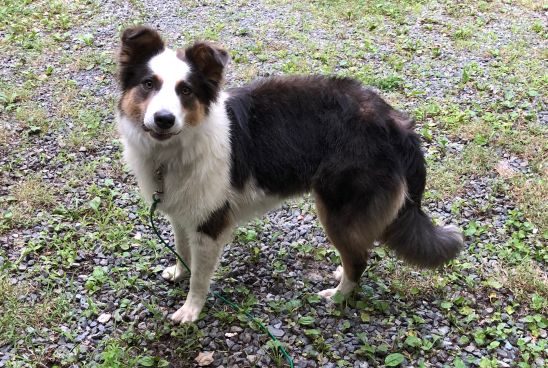
There exists venerable debate regarding whether or not a death long-anticipated or a sudden death is easier for the living to bear. I have experienced long-anticipated deaths with a grandparent and great-grandparent and sudden deaths with my maternal grandfather and Lizzy. I think I would have given much to have time to say goodbye, and yet I know it would have cost much to watch the suffering that time would have inflicted. There are no easy answers.
All I know is that, for me, Chessie’s death was like being pinned beneath an avalanche of rock, physically incapacitating and forcing me to endure the mental agony of knowing that just a moment. . . an hour. . . a day. . . before, the rocks hadn’t fallen.
I suppose that’s what shock is and what sudden death reaps. It’s the skeletal grin of a reminder that death waits beneath every breath, around every bend that we take too fast, beneath the murky waters of our next casual swim. There’s no anticipating or predicting how often and how easily it can take over. Death reminds us of our powerlessness. It jars us into hysterical perspective on just how much is actually out of our hands. Of how much is beyond our ability to reason or understand.
For me, the irrationality has always been the hardest. It’s probably the only thing capable of turning me into an atheist. I have believed in God-given reason for all of my adult life, and yet suffering and death remain that which is outside of human reason. Ostensibly, the faithful surrender this problem to mystery, trusting that if we cannot comprehend why, at least God–that omniscient and omnibenevolent being–must still be functioning under that all-too-absent principle: reason.
I have struggled with trust all of my life, and it is moments like this–like Chessie’s death–that have the power to turn me into an atheist. Or an antinatalist, a nihilist, or just an idiot who wants to stand outside in the pouring rain, taunting the thunder, goading the lightning, daring a sadistic God to prove once and for all that he’s different from Beckett’s Godot.
Chessie didn’t mind cars, but thought that trucks were a threat to her family. While she was being moved to another tether, an asphalt truck drove by. Chessie slipped her leash and went straight for the truck. She was beyond chasing, beyond catching; they’d previously clocked her at 34 mph. The driver never saw her until the truck bumped over her body, breaking her bones, smearing her blood across the clean slate of the light gray road. And then there was my mom, hugging her dog’s broken corpse, swallowing her grief to comfort the devastated truck driver, and burying her face into a furry body that was still warm.
In a split second, the pure light, the sheer joy, and the inexhaustible love of Chessie was snuffed like a candle. Fifteen years of a life of service to her family was taken from her. Fifteen years of delight, companionship, and abiding presence was taken from my family. From my mother. From Cece.

After death, everyone wants to know what they can do to help, and no one answers with the hard truth. In the weeks following Lizzy’s death, I repeated, “Unless you can give me Lizzy back, there is nothing you can do to help me.” Unless you can turn back the clock, infuse reason into the irrational, render sensible the senseless waste of it all–unless you can somehow transform yourself into a deity that does not permit such horror to exist, there is nothing you can do.
Time passed, and I walked through the empty rooms of my sister’s house, sobbing “My baby, my baby,” until my tears turned into contractions and grief, despair, panic, and the will to live fused together in my brain like silver glass. Cecilia came to be with me then, and I found that I had been at least a little bit wrong; there were things that people could do to help. Small things, like refill my water bottle or hold Cece while I showered, and big things like put a roof over our heads, food in our mouths, and offer a safe place to heal.
I wonder now what I can do to help my mother, wonder if things like calling her to let her tell me stories about Chessie, to discuss what to do with her ashes, to think about the possibility of visiting the breeder for a new puppy in time actually help to curb the awesome grief. But I myself have been desperately scrambling for purchase over the past few days and found I had to write this post–to tell the story of Chessie and her death–in order to reclaim some degree of sanity.
I told Cece what happened on the evening of the day Chessie died. Cece doesn’t understand death or blindness or dialysis, but she knew I was crying. For three days, my little blind angel climbed again and again into my lap, asking for hugs, wanting to be held and rocked and warm. I’ve spent hours reading to her, playing with her, neglecting my life and its obligations in favor of allowing myself to drown in my living daughter.
Two days ago, we returned to the bay house, just Cece and me. I walked numbly into the desolation of the garage, allowing my fingertips to drift across Chessie’s hanging leash even as my eyes flicked fearfully towards her water bowl. Her fur coats the mat leading to the kitchen, just as a thin dusting of dog hair still sits on the captain seat of my minivan where she rode, exuberant, next to Cece. Signs of life from a creature no longer alive are sometimes the most unbearable of things.
There was a thunderstorm the night we arrived. I woke afraid, though Cece snoozed gently through the cracking torment. Alone in a house with no other adult and no Chessie on guard, I began to doubt my ability to protect Cece. The darkness closed in, the rain poured, the thunder continued, and I lay in bed, my heart throbbing, knowing exactly how powerless I was.
I don’t like being reminded of how weak I am in the face of real threat. I don’t want to be a victim, and I don’t want to be saved. Mostly, I just want all of this to be over, but that stopped being an option the minute I caught Cecilia in my arms as she entered this world. Instead, I want to become a superhero, to somehow gain superior strength, cunning, and resources so that no scenario can ever leave Cecilia alone and vulnerable and victimized.
I know it’s just a fantasy, and I know I’m not just the craven weakling that shakes, terrified, beneath the covers. I’m also the mother who secures her toddler before bursting into every room of an empty house to make sure it’s secure. I’m the woman who allows her determination to rise with the sun, no matter how much strength the nights seem to rob from me.
The thunderstorms of yesterday gave way to a unbearably perfect morning, but even the cloudless vault of the blue sky and waves riddled with diamond light couldn’t temper the grief of not hearing Chessie’s joyous bark of welcome as our bike skidded to halt on the gravel driveway. We spent ninety minutes splashing in the shallows of low tide, and Cecilia handed me weathered stone after glistening oyster shell. Minnows spun gleefully by our toes as suspicious baby crabs scooted by, attempting unsuccessfully to go unseen. Cece engaged the seagulls in a game of call-and-response, while I guzzled in the piercing, unbroken blue of sky, wave, and blooming sail across the horizon.
Our walks are emptier without Chessie, and her four-legged ghost dances on the porch, concerned paws padding after Cece as she tries again and again to navigate the single concrete step from house to porch. But I have learned how to carry emptiness without trying to fill it with something else. All too often, we forget the the emptiness engendered by grief is already full–too full to adjust to new volume. And we forget also that the more emptiness you are required to bear, the more you find yourself filled to the brim–and bursting–with that which is gone.
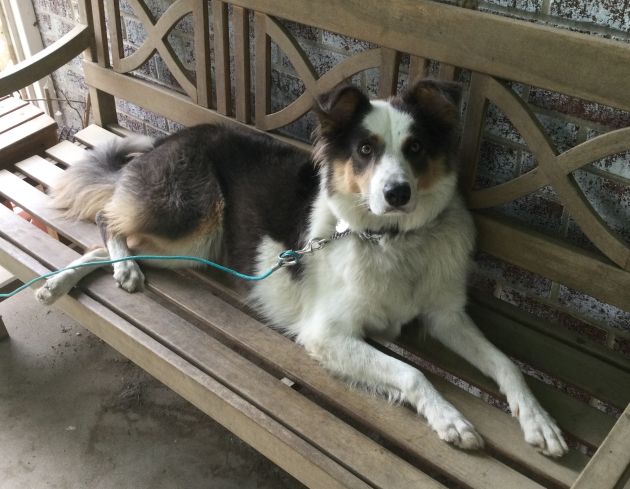
For the past five days, I have repeated the words of my mother’s text message until room could be made for them. Upon first glance, the words lacked reality; within minutes, their meaning was so impossible–so utterly wrong–that my brain felt like it was imploding every time it echoed them. I wanted to rip my head from my shoulders and pop it, cherry-like, between my hands–to allow its bloody refuse to strew the concrete like Chessie’s lifeblood.
I wanted to do violence to myself to accommodate that which there was no room to accommodate. There was no relief, and there was no answer. There was incapacity until I repeated the information often enough to force my brain to make room for it. Every time you say it, it makes it a little less impossible. So you repeat and repeat, carving out a new psychological tomb with each sharp thud of the verbal chisel. You tell the story until you don’t need to tell it anymore. Until the conceptual tomb is glossy, pristine, and open to visitors. And if you tell the story enough, the story eventually becomes myth, and the myth becomes legend, and you gain enough distance to let the story reveal some level of truth.
I am far from this point, with both Lizzy and Chessie. I find the closest I have come in the past few days is to enlist Lizzy’s help, for my little saint had a gift with all living things but especially with animals. I have mourned often that my maternal grandfather never got to meet Lizzy or Cece. I mourned that Lizzy, who didn’t live long enough to know her sister out of utero, also didn’t live to love Chessie. I don’t know what happens to animals when they die, but it makes sense to me that the energy that enables creatures to love most likely returns to its source.
As I write this, I’m sitting on the porch where we once sat with Chessie, listening to the waves lapping in the distance as acorns drop an uneven tattoo on the leaf-strewn lawn. I repeat the words of my mother’s text message in my head, chipping away a bit more at that oppressive, cognitive tomb. The desire to end it–to give up, to drown in atheism or thunderstorms–rears, snarling. But I remember the sun sparking golden light against the waves as Cece splashes, giggling, in my lap, and I choose instead to picture Lizzy dancing in a garden that never dies, a romping Chessie ecstatically by her side.
Perhaps this vision makes me a fool or a coward. Or perhaps it’s carving me, piece by broken piece, into the superhero I need to become to protect Cecilia. Either way, all that is truly mine is my choice, day by aching day. And on this day, cradled by the blue firmament of sky and consoled by my living daughter asleep at my side, I choose to believe.

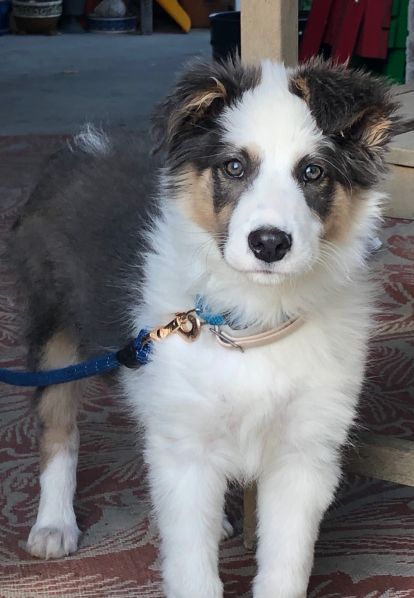
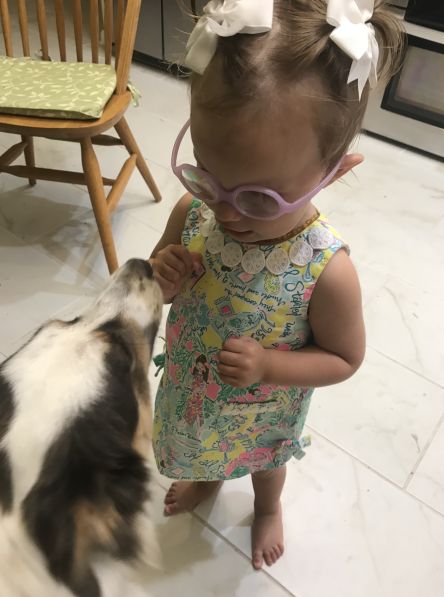
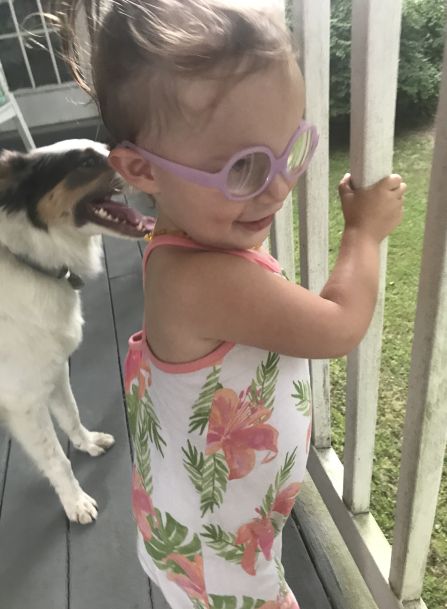
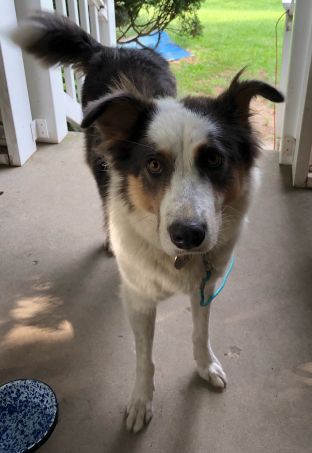
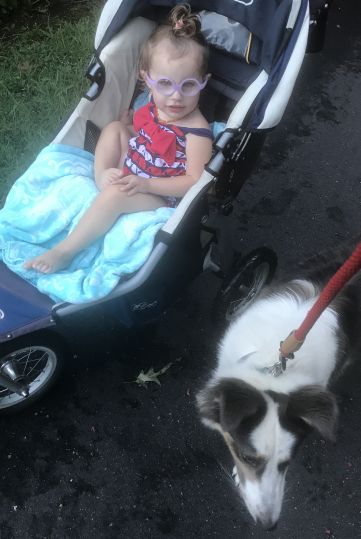
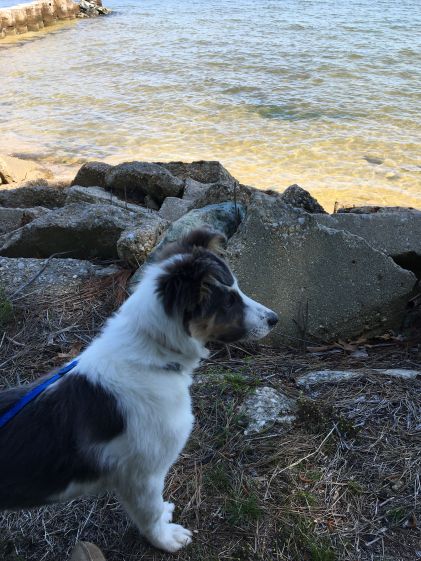
A wonderful tribute to a loving animal. You prove time and again that writing is a catharsis, a method of healing, and atonement for past transgressions. You are a superhero….